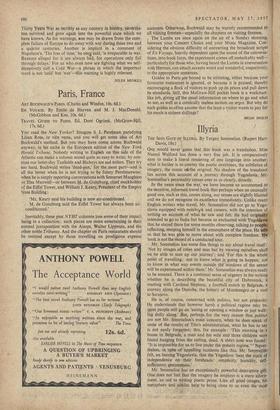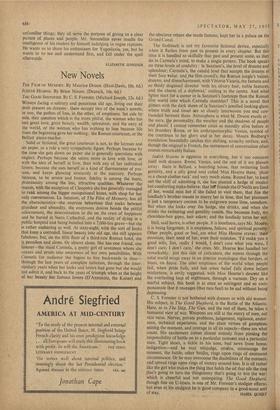Illyria
ONE would never guess that this book was a translation. Miss Naomi Walford has done a very fine job. It is comparatively easy to make it literal rendering of one language into another; what is harder is to convey the poetic overtones, the subtleties of imagery, the music oit,the original. No shadow of the translator lies across this account of a journey through Yugoslavia. Mr. Sommelius's personality comes over to us clearly, directly.
In the years since the war, we have become so accustomed to the sensitive, informed travel book that perhaps when an unusually good one, such as this, comes along, our senses are slightly blunted and we do not recognise its excellence immediately. Unlike many English writers who travel, Mr. Sommelius did not go to Yugo- slavia equipped with notebc,ok and camera, with the intention of writing an account of what he saw and felt. He had originally intended to go to India but became so enchanted with Yugoslavia that he stayed there for some months observing, talking to people; reflecting, steeping himself in the atmosphere of the place. He tells us that he was able to move about with complete freedom. His book is not the record of a conducted tour.
Mr. Sommelius has some fine things to say about travel itself : 'Not by images of cities and seas but by viewing ourselves shall we be able to sum up our journey'; and 'For this is the whole point of travelling : not to know what is 'going to happen; not to know in what way events outside the windows of the senses will be experienced within them.' Mr. Sommelius was always ready to be amazed. There is a continual sense of urgency in his writing whether he is describing the beautiful city of Dubrovnik, a meeting with Cardinal Stepinac, a football. match in Belgrade, a journey along the Danube, the history of Montenegro or a visit to Sarajevo.
He is, of course, concerned with politics, but not primarily. He understands that however harsh a political regime may be, ipost people still go on 'eating or opening a window or just walk- ing dully along.' But, perhaps for the very reason that, politics are not Mr. Sommelius's main concern, when he does speak of some of fhe.results of Tito's administration, what he has to say is not easily forgotten; this, for example : 'This morning in a house in Belgrade, a man and his wife and three children were found hanging from the ceiling, dead. A skirt note was found: "It is impossible for us to live under the present regime." ' Never- theless, in spite of appalling incidents like this, Mr. Sommelitts felt, on leaving Yugoslavia, that the Yugoslays 'bear the mark of independence on their foreheads: simplicity, humility, self- sufficiency, genuineness.'
Mr. Sommelius has an exceptionally powerful descriptive 4ift. One does not feel that the imagery he employs is a mere adorn- ment, an aid to writing poetic prose. Like all gOod images, his metaphors and similes help to bring close to us even the' most
unfamiliar things; they all serve the purpose of giving us a clear picture of places and people. Mr. Sommelius never insults the intelligence of his readers by himself indulging in vague raptures. He wants us to share his enthusiasm for Yugoslavia, yes, but he wants us to see and understand first, and fall under the spell afterwards.
ELIZABETH JENNINGS



































 Previous page
Previous page